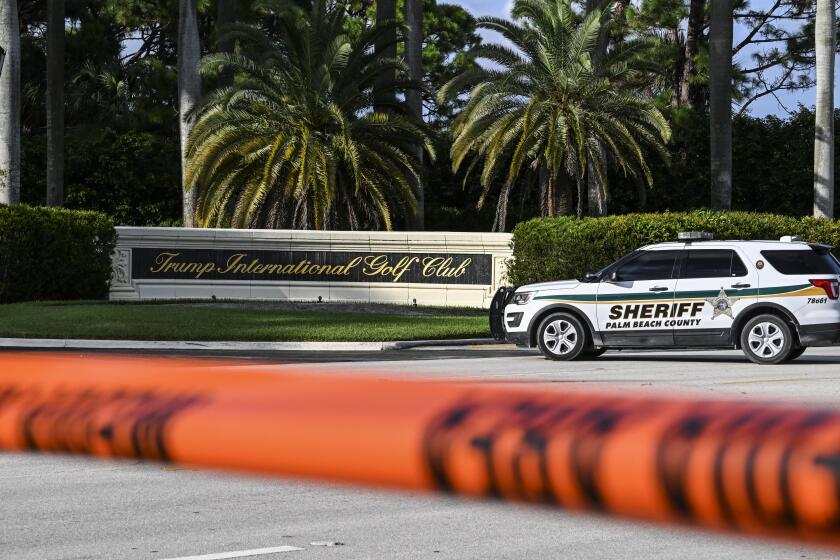Ukraine Teeters Between Two Futures After Voting
Former Prime Minister Yulia Tymoshenko, a key player in Ukraine’s Orange Revolution, pressed forward Monday with a bid to return to power at the head of a restored coalition of pro-Western parties.
With ballots still being counted from Sunday’s parliamentary elections, Tymoshenko’s bloc and two other parties that stood together in the 2004 people’s revolt against electoral fraud appeared set to win a solid majority of seats. The parties, however, will have to repair a rift that drove them to run separately in these elections.
Tymoshenko told an evening news conference that she and President Viktor Yushchenko, a former ally who ousted her from the prime minister post in September, would meet today to discuss the outlines of an agreement.
Nonetheless, a coalition between Yushchenko and his former nemesis, the pro-Russia Viktor Yanukovich, whose election was nullified by the 2004 revolution, remained a longshot spoiler for Tymoshenko’s aspirations.
Weeks of negotiation are expected before the pro-Orange Revolution parties form a coalition and divide up governmental posts. But Tymoshenko said a general memorandum of agreement might be signed quickly.
“I think every hour is important now. The sooner we show society a clear position, unity and confidence ... the better it will be,” she said. “I hope that tomorrow we’ll be able to solve all problems, with the participation of the president.”
The charismatic Tymoshenko was Yushchenko’s first prime minister, but he dismissed her amid infighting among aides, disputes over economic policy and allegations of corruption.
Tymoshenko and Yushchenko agree that Ukraine should have a market-oriented democracy modeled after Western European countries, but Yushchenko has favored a cautious, hands-off approach to economic issues, while Tymoshenko has been more interventionist.
Yanukovich’s Party of Regions, which has its power base in Russian-speaking eastern Ukraine, is closely allied with big business interests and favors closer ties to Russia.
Critics charge that Tymoshenko frightened away foreign investors by raising too many questions about the privatization process under former President Leonid D. Kuchma.
Tymoshenko said Monday that politicians should let the courts sort out suspected instances of corrupt privatization without foreign or domestic pressure. She also pledged that her bloc would seek to end parliamentarians’ immunity from criminal prosecution.
“Until we solve the immunity issue, it will be impossible to make politicians responsible for their actions, and we will not be able to say that people are equal and politics are transparent,” she said.
Tymoshenko also reiterated Monday that as prime minister she would renegotiate a controversial natural gas deal with Russia.
Many of those who cast ballots for Tymoshenko’s bloc or Yushchenko’s Our Ukraine said they respected both leaders and wished to see a revived coalition of those two parties and the Socialists.
With nearly 62% of the votes counted, the Party of Regions, headed by Yanukovich, who lost to Yushchenko in the replay of the 2004 race, was in first place with 29%. Tymoshenko’s bloc was second, with 22.6%, and Yushchenko’s Our Ukraine was third, with 15.7%. The Socialists had 6.4% and the Communists 3.5%. Seats in the 450-seat parliament are allocated proportionally according to the party vote. No other parties of the 45 competing in the elections met the 3% threshold to win a seat.
If the preliminary percentages hold up for the full ballot count, the pro-Orange Revolution parties will get about 60% of the parliamentary seats, while Yanukovich’s party and the Communists will have a total of 40% -- a wider margin than the Orange parties’ victory over Yanukovich in 2004.
Before the elections, Yushchenko and other leaders of Our Ukraine said they would prefer to reestablish the Orange coalition, but they refused to rule out the possibility of forming a coalition with Yanukovich’s Party of Regions.
Advocates say such a coalition would unite the country. The Orange parties are strong in the capital, Kiev, and in the Ukrainian-speaking regions of western Ukraine, while Yanukovich’s party is strong in the Russian-speaking east. But Tymoshenko charged Monday that such a “grand coalition” would simply grant political power to corrupt business groups from eastern Ukraine.
Petro Poroshenko, a wealthy businessman and politician who is a key figure in Yushchenko’s Our Ukraine, said Monday that the party wished to revive the coalition and had already proposed basic terms. But he declined to answer directly whether he was willing to see Tymoshenko become prime minister again, saying only, “I’m willing to see that the prime minister would be a representative of the Orange coalition.”
The Party of Regions, meanwhile, appears ready to take advantage of any crack in the Orange coalition. “We will calmly wait through the first round, when an Orange coalition between three political forces will be signed,” said Taras Chornovil, a Party of Regions leader, in remarks reported by the Russian news agency Itar-Tass. “And when one of the parties -- I believe it will be the Socialists -- withdraws ... we will enter the normal negotiating process.”
More to Read
Sign up for Essential California
The most important California stories and recommendations in your inbox every morning.
You may occasionally receive promotional content from the Los Angeles Times.










